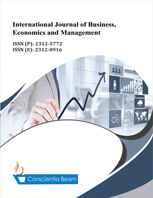The Exchange Rate Volatility and Moroccan Exports: An Empirical Investigation
DOI:
https://doi.org/10.18488/62.v9i4.3070Abstract
This article aims to study exchange rate volatility and its impact on exports. We examine using a VECM model the relationship between Moroccan exports and the volatility of the real effective exchange rate, over a period from the first quarter of 2000 to the first quarter of 2017. The methodology adopted takes into account the long-term relationship term between the variables, using the moving standard deviation as a measure of volatility and real-world GDP as a proxy for global demand. Although a large number of empirical studies find that exchange rate volatility tends to reduce the level of foreign trade. Our results indicate that the increase in exchange rate volatility has a positive effect on the demand for Moroccan exports. Also, the short-term dynamics show that the Granger causal effects of volatility on real exports are significant. Moreover, this article joins the empirical studies that confirm the risk-loving behaviour of exporters in the face of risk of fluctuating exchange rates.

